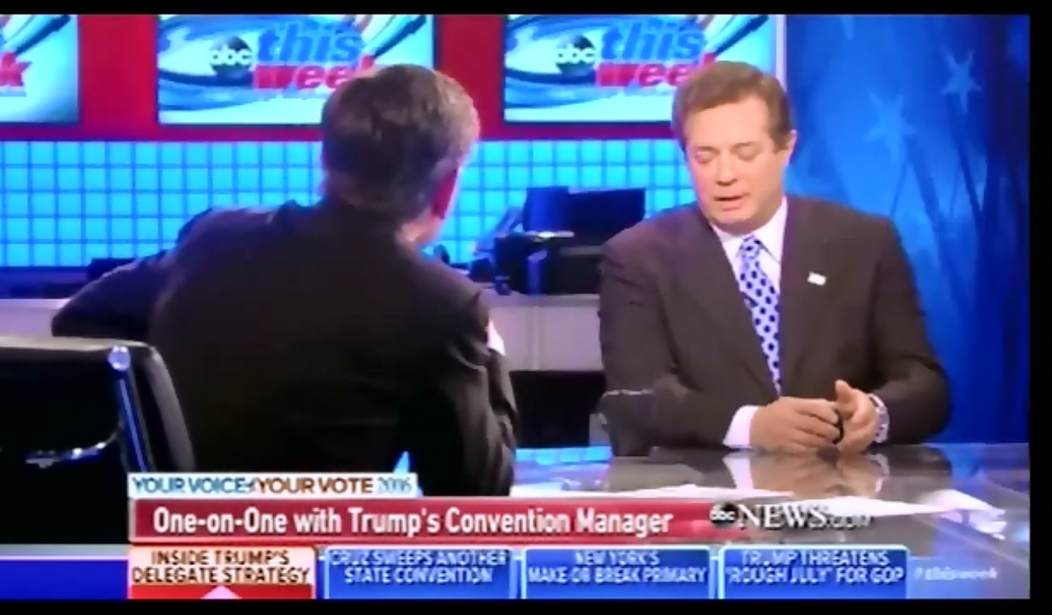Just how entrenched with foreign governments (and Democrats) is Donald Trump’s campaign chairman, Paul Manafort?
Question two would be: Is this shakeup in Trump’s organization an attempt to derail the questions about those foreign ties?
I’m speculating here, but POLITICO has raised a curious story about Manafort’s practices that add fuel to that particular fire.
Donald Trump’s campaign chairman helped a pro-Russian governing party in Ukraine secretly route at least $2.2 million in payments to two prominent Washington lobbying firms in 2012, and did so in a way that effectively obscured the foreign political party’s efforts to influence U.S. policy.
Under federal law, U.S. lobbyists must declare publicly if they represent foreign leaders or their political parties and provide detailed reports about their actions to the Justice Department. A violation is a felony and can result in up to five years in prison and a fine of up to $250,000.
Manafort was working with Rick Gates at that time. Gates is another strategist with Team Trump. Together, Manafort and Gates worked for Viktor Yanukovych’s political party, during the time that Yanukovych was president of Russa.
Gates helped direct the work of a nonprofit that was very much pro-Yanukovych and put them in contact with Washington lobbying firms, Podesta Group Inc. and Mercury LLC.
The nonprofit, the newly created European Centre for a Modern Ukraine, was governed by a board that initially included parliament members from Yanukovych’s party. The nonprofit subsequently paid at least $2.2 million to the lobbying firms to advocate positions generally in line with those of Yanukovych’s government.
That lobbying included downplaying the necessity of a congressional resolution meant to pressure the Ukrainian leader to release an imprisoned political rival.
Just as an aside, the Podesta Group was founded and chaired by Tony Podesta, brother of John Podesta, a Democrat strategist and campaign chairman of Hillary Clinton.
The head of Mercury is Vin Weber, a former Republican congressman and special policy adviser to Mitt Romney, who announced earlier this month that he would not be supporting Donald Trump.
After being introduced to the lobbying firms, the European nonprofit paid the Podesta Group $1.13 million between June 2012 and April 2014 to lobby Congress, the White House National Security Council, the State Department and other federal agencies, according to U.S. lobbying records.
The nonprofit also paid $1.07 million over roughly the same period to Mercury to lobby Congress. Among other issues, Mercury opposed congressional efforts to pressure Ukraine to release one of Yanukovych’s political rivals from prison.
One former Podesta employee, speaking on condition of anonymity because of a non-disclosure agreement, said Gates described the nonprofit’s role in an April, 2012 meeting as supplying a source of money that could not be traced to the Ukrainian politicians who were paying him and Manafort.
There were apparently some tensions over this arrangement in the Podesta Group, with at least one member who strongly felt the arrangement was illegal.
It’s a rather twisted and complicated matter, but it does raise a lot of questions about the comfort Manafort and Gates had with working so closely with governments that may not be cohesive with U.S. interests.
A legal opinion drafted for the project for Mercury in May 2012, and obtained by AP, concluded that the European Centre qualified as a “foreign principal” under the Foreign Agents Registration Act but said disclosure to the Justice Department was not required. That determination was based on the nonprofit’s assurances that none of its activities was directly or indirectly supervised, directed, controlled, financed or subsidized by Ukraine’s government or any of the country’s political parties.
None of this directly points to Russia as the power behind Manafort, therefore, by association, to Trump. It’s just one more curious piece to a very twisted puzzle.














Join the conversation as a VIP Member